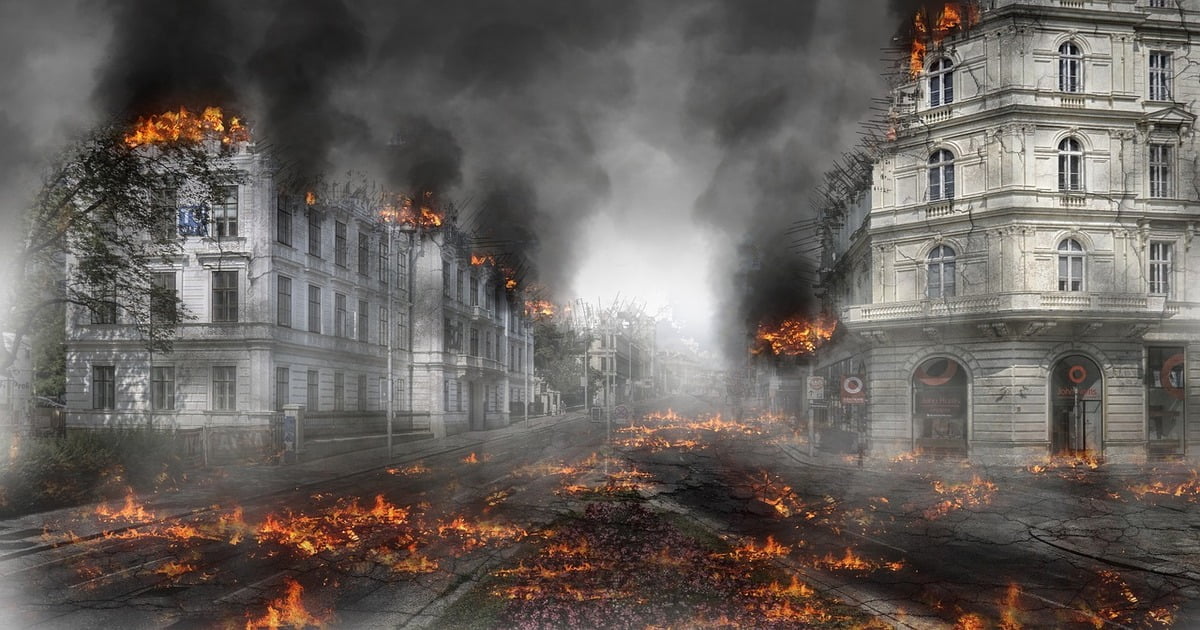War & UK Economy, with a Focus on Property Prices
In the wake of the ongoing conflict between Russia and Ukraine, the global economy stands on uncertain ground, with ripple effects reaching far and wide.
We are dedicated to providing insightful analysis for UK landlords; we delve into the potential ramifications of this geopolitical crisis on the UK economy, particularly emphasising its impact on property prices.
Economic Stability Amidst Geopolitical Turmoil
Like many others, the UK economy is intricately connected to the stability of the global market.
Geopolitical tensions, such as those between Russia and Ukraine, can introduce volatility and uncertainty, influencing investor confidence and market dynamics.
Impact on Property Prices
Short-Term Volatility
The property market may experience short-term volatility in the aftermath of significant geopolitical events, such as the Russia-Ukraine conflict.
Investors may adopt a cautious approach, leading to fluctuations in property prices as demand and supply dynamics adjust to the new geopolitical reality.
Flight to Safe Assets
During geopolitical turmoil, investors often seek refuge in safe-haven assets, including real estate.
As a result, specific segments of the UK property market, such as prime residential properties in London, may experience increased demand, potentially driving up prices in these areas.
Economic Indicators and Market Sentiment
Key economic indicators, including consumer confidence, inflation rates, and interest rates, play a crucial role in shaping market sentiment and influencing property prices.
Fluctuations in these indicators may amplify market volatility and impact the trajectory of property prices in the UK in the context of the Russia-Ukraine conflict.
Policy Response and Regulatory Measures
In response to external shocks, such as geopolitical crises, governments often implement policy measures to stabilise the economy and mitigate adverse effects.
In the UK, policymakers may consider fiscal stimulus packages, monetary policy adjustments, and regulatory interventions to support the property market and ensure economic resilience.
Long-Term Structural Implications
Beyond the immediate impact, the Russia-Ukraine conflict may have long-term structural implications for the UK economy and its property market.
Factors such as changes in trade patterns, geopolitical realignments, and shifts in global supply chains could reshape the economic landscape, influencing investment trends and property market dynamics in the years to come.
Economic Stability Amidst Geopolitical Turmoil
The UK economy has historically demonstrated resilience in the face of geopolitical upheavals. However, the interconnected nature of global markets means that no economy is immune to external shocks.
As the Russia-Ukraine conflict unfolds, policymakers, economists, and market participants closely monitor developments to gauge potential risks and opportunities.
Impact on Property Prices
Short-Term Volatility
In the short term, uncertainty stemming from geopolitical tensions can lead to fluctuations in property prices. Market sentiment may sway as investors assess the conflict’s implications for economic growth, trade relations, and financial stability.
Consequently, property transactions may experience delays or adjustments as buyers and sellers recalibrate their strategies in response to changing market conditions.
Flight to Safe Assets
Amidst geopolitical uncertainty, investors often seek safe-haven assets to preserve capital and hedge against risk.
Real estate, particularly prime properties in stable markets, may attract increased demand from investors looking for long-term value preservation.
This flight to quality can exert upward pressure on property prices, especially in sought-after locations with strong fundamentals and reliable returns.
Economic Indicators and Market Sentiment
Economic indicators serve as barometers of market sentiment and economic health. Indicators such as consumer confidence, inflation rates, and interest rates provide insights into the underlying strength of the economy and its resilience to external shocks.
Changes in these indicators can influence investor behaviour and shape property price trajectory during geopolitical turbulence.
Policy Response and Regulatory Measures
Governments and central banks play a pivotal role in stabilising economies during crises.
In response to the Russia-Ukraine conflict, policymakers may implement measures to support economic activity, bolster market confidence, and safeguard financial stability.
These measures could include fiscal stimulus packages, monetary policy adjustments, and regulatory interventions to promote investment, facilitate liquidity, and address market imbalances.
Long-Term Structural Implications
While short-term fluctuations are inevitable, the long-term impact of the Russia-Ukraine conflict on the UK economy and property market depends on a myriad of factors.
Structural changes in global trade patterns, geopolitical realignments, and disruptions to supply chains could reshape the economic landscape and redefine investment priorities.
Investors and stakeholders must assess these evolving dynamics and adapt their strategies to navigate the challenges and capitalise on emerging opportunities.
Conclusion
In conclusion, the ongoing conflict between Russia and Ukraine has the potential to reverberate across the UK economy, with implications for property prices and market stability.
While short-term volatility may prevail, long-term prospects depend on economic factors, policy responses, and global developments.
As we navigate these uncertain times, staying informed and attuned to evolving trends will be essential for investors, policymakers, and stakeholders in the property market.
This comprehensive analysis sheds light on the intricate interplay between geopolitical events, economic dynamics, and property market trends, providing valuable insights for investors and stakeholders navigating the evolving landscape.
FAQ
How does the Russia-Ukraine war impact UK property prices?
The Russia-Ukraine war can influence UK property prices through various channels, including short-term volatility, flight to safe assets, and changes in economic indicators and market sentiment.
Investors may seek refuge in real estate as a safe-haven asset, potentially driving up prices in specific segments of the market.
What role do economic indicators play in shaping property prices during geopolitical crises?
Economic indicators such as consumer confidence, inflation, and interest rates are barometers of market sentiment and economic health.
Changes in these indicators can influence investor behaviour and market dynamics, thereby impacting property prices during times of geopolitical uncertainty.
How do policymakers respond to geopolitical crises like the Russia-Ukraine conflict?
In response to geopolitical crises, policymakers may implement measures to support economic activity, bolster market confidence, and safeguard financial stability.
These measures could include fiscal stimulus packages, monetary policy adjustments, and regulatory interventions to stabilise the economy and mitigate adverse effects on the property market.
What are the long-term structural implications of the Russia-Ukraine conflict on the UK economy and property market?
The long-term impact of the Russia-Ukraine conflict depends on factors such as changes in trade patterns, geopolitical realignments, and disruptions to global supply chains.
These structural shifts could reshape the economic landscape and influence investment trends, requiring stakeholders to adapt their strategies to effectively navigate the evolving dynamics.
Links with resources and companies affected by the war
Resources and Companies Affected by the Russia-Ukraine Conflict
Energy Resources:
Gazprom: As Russia’s state-owned gas company, Gazprom plays a significant role in supplying natural gas to Europe. The conflict may disrupt gas supplies, affecting energy markets and companies reliant on Russian gas.
Naftogaz: Ukraine’s national gas company, Naftogaz, is directly impacted by the conflict due to its role in gas transit and energy security in Europe.
Agricultural Commodities:
Grain Exporters: Ukraine is a major exporter of grains such as wheat and corn. The conflict may disrupt agricultural production and export routes, affecting global food prices and companies involved in grain trading.
Fertiliser Producers: Companies that produce fertilisers, essential for agricultural productivity, may face supply chain disruptions due to the conflict’s impact on raw material availability and transportation routes.
Defence Contractors:
Military Suppliers: Companies involved in defence manufacturing and supply chains may experience increased demand for military equipment and technology as countries bolster their defence capabilities in response to the conflict.
Financial Institutions:
Banks and Financial Markets: Financial institutions operating in regions directly affected by the conflict may experience market volatility and geopolitical risk, impacting their operations and financial performance.
Technology and Cybersecurity:
Cybersecurity Firms: The Russia-Ukraine conflict has raised concerns about cybersecurity threats, prompting increased demand for cybersecurity solutions and services to safeguard critical infrastructure and data.
Shipping and Logistics:
Shipping Companies: The conflict may affect maritime routes and ports in the Black Sea region, potentially disrupting global shipping and logistics operations.
Humanitarian Organisations:
Relief Agencies: Humanitarian organisations providing aid and assistance to affected populations in Ukraine and neighbouring countries are directly involved in responding to the humanitarian crisis resulting from the conflict.
Infrastructure Development:
Infrastructure Companies: Companies involved in infrastructure development and reconstruction may play a role in rebuilding efforts in conflict-affected areas, including transportation, utilities, and housing projects.
Multinational Corporations:
Global Companies: Multinational corporations with operations or supply chains in the region may face challenges related to geopolitical instability, regulatory changes, and market uncertainty resulting from the conflict.
Insurance and Risk Management:
Insurance Providers: Insurance companies offering coverage for political risk, supply chain disruptions, and geopolitical events may see increased demand for their services as businesses seek to mitigate risks associated with the conflict.
These are just a few examples of resources and companies that may be affected by the Russia-Ukraine conflict.
The impact varies across industries and regions, highlighting the global economy’s interconnectedness and the need for proactive risk management and strategic planning in times of geopolitical uncertainty.
The British Landlords Association is a national landlords association for UK landlords. It is one of the largest landlord associations in the UK. Join us now for £79.95!
Our top read blogs:
Electrical safety inspection Guide for landlords – how often should you do the checks?
10 important things about the new Electrical Safety Regulations for Landlord
How do you deal with a tenants disrepair claim and avoid misery?
Disclaimer:
This post is for general use only and is not intended to offer legal, tax, or investment advice; it may be out of date, incorrect, or maybe a guest post. You are required to seek legal advice from a solicitor before acting on anything written hereinabove.





